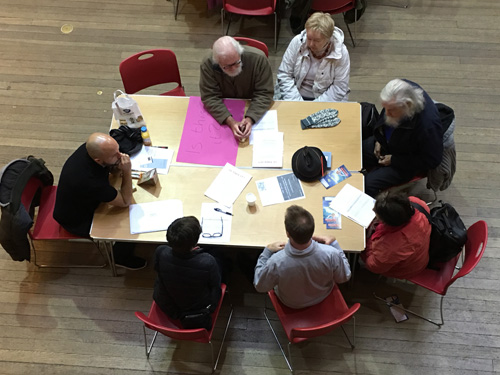
Your complimentary articles
You’ve read one of your four complimentary articles for this month.
You can read four articles free per month. To have complete access to the thousands of philosophy articles on this site, please
News
News: February/March 2016
University scraps philosophy exams • Ethics teaching the Meiji way • Canadians consider euthanasia for children — News reports by Anja Steinbauer
Euthanasia for Children?
Passive euthanasia, withdrawing or withholding treatment with the effect of hastening a patient’s death, has long been legal in Canada. Active euthanasia, taking positive measures to bring about a patient’s death, will soon also be legal as per a decision of the Supreme Court of Canada in February 2015. A new public debate has emerged in the wake of this step: Should the right to ask for one’s own life to be terminated to be extended to children too?
It is not as strange a thought as it may seem: in the Netherlands euthanasia is lawful for patients over the age of 12, in Belgium for terminally ill children of any age if they are experiencing ‘constant and unbearable suffering’. The consent of parents and doctors is, of course, needed. Dr Eduard Verhagen is a lawyer and the medical director at the department of paediatrics at the University Medical Center Groningen. He argues that “most children with a life-limiting illness, before they have even entered the terminal phase, have made decisions about their treatment, and about their lives 30, 40 or 50 times.” A Canadian provincial-territorial advisory panel has now argued that access to doctor-assisted dying should not be hindered “by the imposition of arbitrary age limits.”
Arthur Caplan, head of medical ethics at New York University’s Langone Medical Center comments: “Setting the precedent that the state is going to tolerate killing children, even mature minors, is very, very dangerous… It’s the slippery slope argument, and this is a slope I worry about. Sometimes I don’t, but this one I do.” There is also serious opposition from medical practitioners: “Most of our fight is about kids that want to live … not most of our fight, all of our fight is about that, and how to do it with as minimal suffering as possible,” says Dr Stephen Liben, director of the Montreal Children’s Hospital pediatric palliative care programme. “The last thing I need as a palliative care physician for children is a euthanasia law.”
Traditional Japanese Ethics Returns
Japanese Prime Minister Shinzo Abe has taken steps to make traditional Japanese ethics a formal school subject from 2018. Japanese conservatives are on a quest to restore the values they say were rooted out during the US occupation after World War II. Part of an ongoing debate over national values and identity, the new teaching plans reflect their concern that Japanese people, especially the young, hold their own country and its history in low regard due to an over-emphasis in lessons on Japan’s wartime aggressions.
The foundations of the new ethics syllabus will be the Imperial Rescript on Education signed by the Emperor Meiji in 1890. This document, once treated as sacred by Japanese schools, stresses the development of a range of social virtues including filial piety and loyalty to the state. The guidelines are now being worked into textbooks, ready to be used in new ethics classes taught in elementary and middle schools starting in 2018.
Nadine and Edgar
Meet Nadine, an emotionally intelligent robot employed as a receptionist at Nanyang Technological University in Singapore. She has her own personality, talks and behaves like a human, and expresses emotions and change of moods as appropriate to topic and tone of the situation. She can recognise people she’s met before and remember what was said during previous conversations. “This is somewhat like a real companion that is always with you and conscious of what is happening,” Nadia Thalmann, a robotics professor NTU’s School of Computer Engineering, argues in a press release. “So in future, these socially intelligent robots could be like C-3PO, the iconic golden droid from Star Wars, with knowledge of language and etiquette.”
Now meet Edgar, a tele-presence robot constructed by the same team as Nadine at NTU. He can emulate the movements of his human user in real time. Using a webcam, he can be controlled from anywhere in the world. He can interact with humans, sociably smiling and saying hello and read a programmed script. “Telepresence provides an additional dimension to mobility,” says engineering professor Gerald Seet. “The user may project his or her physical presence at one or more locations simultaneously, meaning that geography is no longer an obstacle.”
No More Exams!
In a radical move, the University of Essex is scrapping all philosophy exams: “In the advanced study of a subject like philosophy, we need to test students’ ability to think in an original and creative way, rather than simply their power of recall”, argues Professor Fabian Freyenhagen, head of the university’s School of Philosophy in an article in The Guardian newspaper. Instead of cramming for exams, students will take extra modules in the summer term to pursue philosophical questions in greater depth. They will demonstrate their learning through assessed coursework; tests on unseen questions will still be used in a few contexts, such as assessing logic skills.
Philosophy Now Festival
We’d like to offer our deepest thanks to all the speakers, volunteers and members of the public who took part in the 3rd Philosophy Now Festival on 21 November 2015. There’s a picture gallery in the ‘photos’ section of our Facebook page at: facebook.com/philosophynow and we are uploading videos to our YouTube channel.










